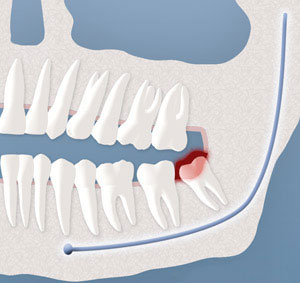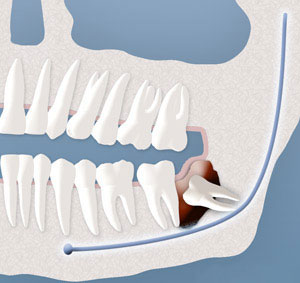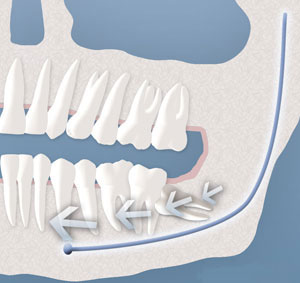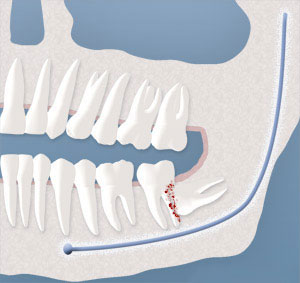Wisdom Teeth Removal
Why should I have my wisdom teeth removed?
If you do not have enough room in your mouth for your third molars to fully erupt, a number of problems can happen. Impacted wisdom teeth should be removed before their root structure is fully developed. In some patients, it is as early as 12 or 13, and in others, it may not be until the early twenties. Problems tend to occur with increasing frequency after the age of 30. Some of the possible problems related to not removing your wisdom teeth include:
Why Remove Wisdom Teeth?
Wisdom teeth are the last set of molars to emerge, often during the late teens or early twenties. Because there’s usually not enough space in the mouth, these teeth can become impacted—growing in at an angle or getting stuck below the gumline. Impacted wisdom teeth can lead to crowding, pain, infection, and damage to surrounding teeth. Even when they partially erupt, they’re difficult to clean and more prone to decay and gum disease. At Redlands Oral Surgery, we perform wisdom tooth removal with your comfort in mind, helping protect your oral health and prevent future complications.
Our board-certified oral surgeons are committed to making your wisdom teeth removal smooth, efficient, and as comfortable as possible from start to finish.

Infection:
The most frequent clinical problem we see is pericoronitis, (a localized gum infection). Without enough room for total eruption, the gum tissue around the wisdom tooth can become irritated and infected, resulting in recurrent pain, swelling, and problems with chewing and/or swallowing.

Cyst Formation:
Non-infectious diseases may also arise in association with an impacted wisdom tooth. Cysts are fluid-filled “balloons” inside the jaw bone that develop as a result of impacted teeth and slowly expand, destroying adjacent jaw bone and occasionally teeth. They can be very difficult to treat if your wisdom teeth are not removed in your teenage years. Although rare, tumors can be associated with the delayed removal of wisdom teeth.

Possible Crowding:
Impacted wisdom teeth may contribute to crowding of your teeth. This is most noticeable with the front teeth, primarily the lower front teeth and is most commonly seen after a patient has had braces. There are a number of factors that cause teeth to crowd after braces or in early adulthood. Retained, impacted wisdom teeth may be a contributing factor. Unless you have an active problem when you see the oral surgeon, the reason for removal is primarily to prevent long-term damage to your teeth, gums and jaw bone.

Damage to Adjacent Teeth:
If there is inadequate room to clean around the wisdom tooth, the tooth directly in front, the second molar, can be adversely affected, resulting in gum disease, bone loss around the tooth, and/or decay.
Before, During & After Surgery
Preparing for Oral Surgery
To ensure a safe and successful procedure, please follow these important pre-surgery guidelines:
-
No eating or drinking after midnight before your surgery. Anesthesia on a full stomach can lead to serious complications, including regurgitation and blocked airways.
-
Be honest about all medications and substances you’ve taken, including over-the-counter drugs, prescriptions, alcohol, and recreational substances. This information helps us avoid potentially dangerous interactions with anesthesia.
-
Do not smoke for at least 12 hours before your procedure, as it can interfere with healing and increase the risk of complications.
-
Plan ahead for your recovery. You’ll need to rest at home for a couple of days, so set up a comfortable recovery space in advance.
-
Stock up on soft foods for your return home. Options like soup, mashed potatoes, yogurt, applesauce, smoothies, and ice cream will be gentle on your mouth as you heal.
Our team at Redlands Oral Surgery is here to guide you through every step of the process—before, during, and after your procedure.
What to Expect
What to Expect During Wisdom Tooth Removal
It’s completely natural to feel a little anxious about wisdom tooth removal, but at Redlands Oral Surgery, you’re in experienced hands. Our team has performed countless wisdom tooth extractions with precision and care, making the process as smooth and comfortable as possible. Here’s what typically happens during the procedure:
-
A small incision is made in the gum to access the tooth and surrounding bone.
-
If necessary, a portion of bone that covers the tooth root is gently removed.
-
To ease removal, the tooth may be sectioned into smaller pieces.
-
Once the tooth is fully removed, the area is carefully cleaned to prevent infection.
-
The gum may be stitched closed to support healing.
-
Gauze is placed over the site to control bleeding and begin the healing process.
Our team is here to make sure you’re informed, relaxed, and well cared for every step of the way.
Aftercare
Following your wisdom tooth extraction, proper aftercare is essential to ensure a smooth and comfortable recovery. While some swelling and discomfort are expected, closely following your oral surgeon’s instructions can help prevent complications—especially dry socket, a painful condition that occurs when the protective blood clot at the extraction site becomes dislodged.
Here are key tips to support safe and effective healing:
-
Expect light bleeding during the first day. Replace gauze as instructed, and avoid spitting or rinsing forcefully, which can disrupt blood clot formation.
-
Apply ice packs to the outside of your face in 20-minute intervals to reduce swelling for the first day. Most swelling will subside within 48–72 hours.
-
Take pain medication exactly as prescribed to stay ahead of discomfort.
-
Avoid drinking with a straw for at least 2 weeks, as these can interfere with healing.
-
Stay hydrated and stick to soft foods like yogurt, soup, smoothies, mashed potatoes, and pudding for the first 24 hours. Gradually reintroduce semisoft foods as tolerated.
-
Skip brushing, rinsing, and mouthwash for the the day of your surgery.
-
Absolutely avoid smoking for at least 72 hours. Smoking greatly increases the risk of infection and dry socket, and delays your recovery.
Our team at Redlands Oral Surgery is always here to answer questions and support your healing. Don’t hesitate to contact us if you have any concerns after your procedure.
Wisdom teeth FAQs
What if I don’t have my wisdom teeth removed as a teenager or young adult?
As wisdom teeth develop, the roots become longer and the jaw bone more dense. When it is necessary to remove impacted wisdom teeth in your thirties, forties or beyond, the post-operative course can be prolonged and there is a higher complication rate. Treating these complications is often more difficult and less predictable than with a younger patient. Healing may be slower and the chance of infection can be increased. If your impacted wisdom teeth are not removed in your teenage years or early in your twenties and they are completely impacted in bone, it may be advisable to wait until a localized problem (such as cyst formation or localized gum disease and bone loss) develops. In general, you will heal faster, more predictably and have fewer complications if treated in your teens or early twenties.
What does wisdom tooth removal cost and is it covered by insurance?
The fee for your treatment is determined by a number of factors. These may include the difficulty involved in removing your teeth and which type of anesthesia is best for you. During your consultation appointment, the surgeon will need to review your x-rays, complete an examination and determine the best option for anesthesia, before an accurate estimate can be provided. Every insurance company has a different policy regarding the extent of coverage for a given surgical procedure. The oral surgeon’s office staff will help you obtain maximum insurance coverage for your treatment.
What if I have questions before surgery?
At the time of your consultation, your specific situation will be discussed in greater detail. We encourage you to ask any questions you may have. If new questions arise after your consultation, please call our office at Redlands Office Phone Number 909-884-4754 to speak to one of our patient care coordinators.
What happens on the day wisdom teeth are removed?
Most people prefer to be unaware of the experience when they have their wisdom teeth removed and usually decide to be sedated. You will be provided with appropriate anesthesia options at your consultation. All outpatient surgery is performed under appropriate anesthesia to maximize your comfort. Our office staff has the training, licensing, and experience to provide the various types of anesthesia. These services are provided in an environment of optimum safety, utilizing modern monitoring equipment and a well trained experienced staff. The Surgical Care Team, the office facilities, and the doctors are inspected on behalf of the Board of Dental Examiners on a regular basis.
On the day of your procedure, you will take medications to help minimize post-operative pain and swelling. We ask that a parent or responsible adult accompanies you to the office and plans to stay with you the rest of the day. The procedure will take about 30 to 60 minutes and you will probably be in the office for 90 minutes. Recent advances in medicine and technology allow patients to undergo wisdom tooth removal in a manner, which promotes rapid healing and minimal post-operative discomfort. State-of-the-art sterilization and infection control techniques are used at all times.
On the morning or afternoon of your surgery, it is essential that you have nothing to eat or drink (excluding prescription medications with a sip of water) for at least 6 hours (preferably longer). This does not mean you should try to fit in one “last meal” exactly six hours before your surgery. Having anything in your stomach can increase the risk for serious anesthetic complications, including nausea and vomiting. Your procedure will be rescheduled if you have not heeded these guidelines. We may provide you with a prescription for pain medication at your consultation appointment, which for your convenience, can be filled in advance. When you are seated in the surgical room, we will make every effort to make you as comfortable as possible. If you are going to be sedated, we usually will place an IV in your left arm. This is a quick and nearly painless procedure that ensures optimal delivery of your medication. Local anesthesia is given to you afterwards to ensure comfort, and allow adequate time to travel home and rest. You will be sleepy for a significant portion of the day.
